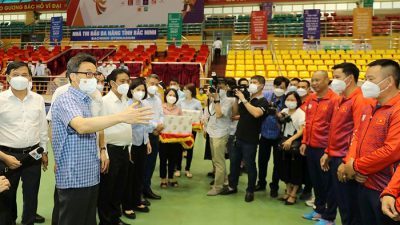
|
Vietnam currently has 16 million workers in industrial and export processing zones (IZs and EPZs), directly producing 60% of the total domestic product annually and contributing 70% of the state budget. |
|
Along with other frontline forces, workers have become silent “soldiers” on the economic front, which has made significant contributions to the production development, bringing Vietnam into the highest economic growth group and maintaining the economic growth rate of 5.64% in the first six months of the year. They deserve to be protected even when the country enters the new normal state. Trade union – one of the frontline forces against the epidemic Dong Nai Province, Binh Duong Province and Ho Chi Minh City are experiencing complicated developments regarding the COVID-19 pandemic. With 4 million workers and employees working in IZs and EPs, accounting for a quarter of total workers around the country, whether the production chain is broken or not depends greatly on the epidemic prevention and control work as well as the protection of workers amidst the attacks of epidemic waves. Binh Duong has more than 1.2 million workers and employees working for enterprises. The workers are currently renting houses in boarding houses adjacent to the factories and industrial zones. The spread of epidemic from renting houses to factories and from factories to the IZs has been a worrying problem. According to a report from the Labour Confederation of Binh Duong Province, about 552 units and enterprises with 53,305 employees have been affected by the epidemic as of the afternoon of July 20. COVID-19 infections were recorded in 52 businesses inside and outside the IZs. As of the afternoon of July 20, trade unions at all levels in Binh Duong Province donated a total of VND3.14 billion to 2,337 workers affected by the Covid-19 epidemic. Pham Thi Thu Huong, a worker at Pung Kook Saigon 3 Factory (An Phu Ward, Thuan An City, Binh Duong), shared: “When the boarding houses were blockaded, we were initially very worried. However, the timely support of essential necessities, such as rice, cooking oil, instant noodles, vegetables, meat and fish, from trade unions, authorities, agencies and hostels has helped us feel secure to stay at home and wait for the day we can return to work”. Vice Chairman of the Provincial Labour Confederation Nguyen Hoang Bao Tran said that the trade unions at all levels have closely followed and actively grasped the situation of workers’ lives and jobs as well as continued to urgently review F0 and F1 cases and workers who were forced to quit their jobs in order to provide them with timely support. The trade unions have also mobilised many resources to join hands to care for their members and employees while coordinating with local authorities, organisations and associations to encourage business establishments and inn owners to exempt, reduce and extend the time for paying rent for employees. In Ho Chi Minh City, COVID-19 epidemic has significantly affected the production activities of 1.6 million workers in thousands of enterprises. To date, nearly 3,000 workers, employees and officials in the city have been infected and over 12,000 have been F1 cases. Despite the many difficulties and the high number of workers affected by the epidemic, trade unions’ assistance policies have promptly helped workers and employees overcome initial difficulties. Two weeks ago, the residence of worker Nguyen Thi Chung from Thien Loc Shoes Joint Stock Company in District 12 was blockaded. Her company’s trade union announced that she was paid 70% of her salary during the 12 days of isolation, except for two Saturdays and Sundays in accordance with the Labour Law. The Ho Chi Minh City Labour Confederation (HCMCLC) has held many activities to assist their members and workers, with total coast of over VND12.5 billion. In response to the call of the Vietnam Fatherland Front Committee, the Vietnam General Confederation of Labour launched the text message movement “All people support the COVID-19 prevention and control” and the Fund for vaccine purchasing, collecting nearly VND7.7 billion. Dong Nai Province has 1.2 million employees working in enterprises, of which about 70% are migrant workers. Vice Chairman of Dong Nai Provincial Labour Confederation Nong Van Dung said that as of July 21, 250 enterprises with around 352,000 workers had been affected by the pandemic, mainly in textile and garment and leather shoes manufacturing industries. The infections appeared in the major businesses consisting of thousands of workers. Meanwhile, thousands of workers were living in locked down communes and wards. Many enterprises in the province have actively allowed workers to be temporarily off work. In addition to material and spiritual assistance, the provincial Trade Union has proposed the Provincial People’s Committee to consider the addition of COVID-19 vaccines for workers as soon as possible. Trade union officials at all levels have been standing side by side, sharing and accompanying with their members and workers. Many of them have joined the frontline forces against the epidemic. President of the VGCL Nguyen Dinh Khang noted that trade unions at all levels have uphold their spirit and responsibility to focus on implementing the dual goal of controlling the epidemic and promoting socio-economic development; as well as sent officials to support workers at the grassroots level. The grassroots trade unions have voluntarily participated in COVID-19 prevention and control groups in businesses. Many creative support activities have been organised such as zero dong supermarkets, COVID-19 safe team and emergency relief team. Facing many difficulties According to general information from the Labour Confederations of southern provinces, right after COVID-19 epidemic penetrated some enterprises with more than 1,000 employees, workers had to live in limited space. Due to the large number of workers and prolonged screening, workers are easily confused and fluctuating. Some businesses are passive because they had to prepare accommodation for workers at the factory following the detection of COVID-19 cases. Although trade unions at all levels have taken timely actions to support their members and workers, the expenditure to support them in the southern provinces and cities is still behind schedule, reaching a low rate compared to the total number of affected infections. This is due to many executive committees of the grassroots trade unions and workers having been quarantined; meanwhile, dossiers to confirm the beneficiaries of support payment submitted by the grassroots trade union are incomplete under the instructions and regulations. It has been difficult to make contact with workers and employees in quarantine and blockade areas. To overcome this fact, in the immediate future, the Labour Confederations of provinces and cities have directed trade unions at all levels to pay them by transferring through their personal accounts. In the near future, the Labour Confederations of provinces and cities will enhance the communications of the Vietnam Social Insurance’s process of supporting enterprises and employees who are affected by the epidemic as well as the policies under the spirit of the Government’s Resolution No.68. Trade unions at all levels continue to maintain the review workers who are F0, F1 and F2 cases as well as proactively coordinate with enterprises to respond to emergency situations. Source: Nhan Dan Online |

